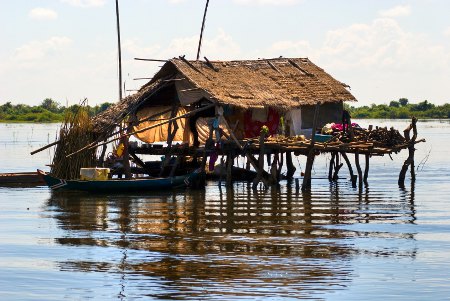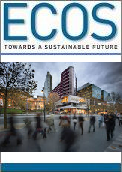
|
Published: 10 October 2011
Australian engineering students ‘make it so’ in Cambodia
Australian engineering students are about to make a huge difference to the quality of life of more than one million Cambodians living in villages on and around Tonle Sap, south-east Asia’s largest freshwater lake and river system.
The floating villages do not have access to appropriate toilet facilities. This has caused widespread contamination of the lake and a range of health issues for the region’s locals. To make matters worse, the lake expands to five times its size during the monsoon season.
Five University of Queensland (UQ) students are among a group of Australian engineering students, including a team from The University of Melbourne, participating in the ‘Make it so’ program initiated by Engineers Australia.
‘Make it so’ began as an awareness campaign and competition in 2010, inviting members of the public to share their ideas on what they would like to see ‘made so’ by engineering professionals.
The competition attracted more than 7000 entries, which covered a range of topics highlighting public concerns regarding renewable energy, climate change and water sanitation – particularly in developing countries.
The competition organisers decided to extend ‘Make it so’ into an ongoing program, under which the five students formed the UQ Innovate Team (UQIT) to participate in the challenge of providing access to a low-technology sanitary waste management system for some of Tonle Sap’s floating villages.
The students – Lx Yeow, Daniel Gillick, Thao Luu, Andy Hariyadi and Kun-Ju-Hsieh – are working on a floating bio-digester capture and storage system that will enable the lake communities to produce methane gas and fertiliser from sanitary waste. The students have partnered with the not-for-profit organisations Engineers Without Borders and Live & Learn Environmental Education to design and implement the bio-digester system.
The floating bio-digester feeds human waste slurry into a storage drum at a slightly elevated air pressure. Heat from the sun promotes an anaerobic reaction inside the drum, which in turn sanitises the waste and produces methane gas. The methane gas is captured in an adjoining drum that ‘floats’ above the storage drum and is stored in portable canisters.
Community members then use the methane as a domestic energy source and the sanitised waste as fertiliser to improve crop yields on land around the lake.
‘Deaths resulting from poor hygiene and sanitation are entirely preventable if clear infrastructure is built towards managing sanitary waste and education is provided to those who are affected,’ says Bachelor of Mechanical Engineering student and UQIT Operations Manager, Daniel Gillick.
Another UQIT member, Andy Hariyadi, says: ‘[Through this project] we hope to shift attitudes and behaviours towards sanitation and hygiene in Tonle Sap.’
‘Our goal is to reduce cases of cholera and other diarrhoeal-related disease. We want to bring about healthy, educated and responsible communities.’
Dr Timothy Nicholson from UQ’s School of Chemical Engineering is mentoring the UQIT students to pursue the project as part of their year-long course in Systems Engineering and Product Design.
‘It is a great opportunity for the group to put into practice what they have learnt during their studies in a real-world problem, and to be able to use their engineering skills for the benefit of humankind,’ says Dr Nicholson.
Since 2003, Engineers Without Borders has been educating Australian engineering professionals and the wider community on issues such as sustainable development, poverty, and disadvantaged and developing areas around the world. The organisation also works in partnership with communities in developing countries to ensure they have access to the knowledge, resources and technological aids that are integral to improving their livelihoods.
Key areas of focus for participating engineers include disaster recovery, water supply, sanitation, energy, waste disposal, transportation, communications and support for people with disabilities.
The ‘Make it so’ project also aligns with Engineers Australia’s 2011 Year of Humanitarian Engineering. The Year’s goal is to ‘promote the significance and importance of humanitarian engineering to both the engineering profession and wider community so that humanitarian engineering receives the necessary support in Australia and abroad – and continues to make a difference’.
At the Australian Humanitarian Engineering Summit in Brisbane in July, Mr Simon McKeon – Australian of the Year and CSIRO Chairperson – called for more engineering businesses to throw their weight behind the humanitarian engineering cause.
Engineers Australia, Engineers Without Borders and another not-for-profit group, RedR, have organised a Humanitarian Engineering Conference to be held later this year in Melbourne.
The founding President of RedR Australia was the late Professor Fred Hollows AC – an Australian ophthalmologist who introduced modern cataract surgery to developing countries and initiated the state-of-the-art Fred Hollows Intraocular Lens Laboratory in Nepal. In 1992, Prof. Hollows challenged Australian engineers to apply their ingenuity and resources to the alleviation of suffering: wherever it occurred.




